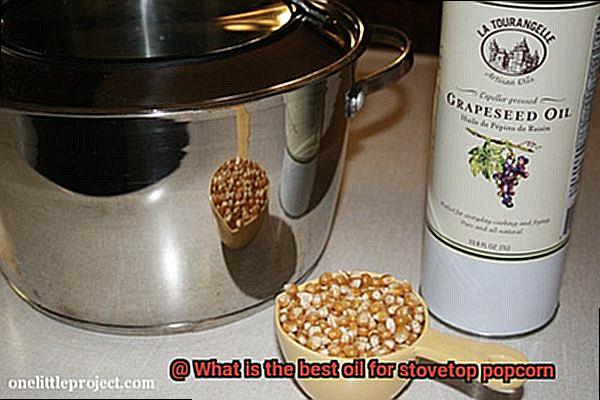Popcorn is the quintessential snack that has been a crowd-pleaser for generations. Whether you’re snuggled up on the couch watching a movie or need a quick snack to munch on, popcorn is always a reliable option. But what sets homemade stovetop popcorn apart from its microwavable counterpart? The answer lies in the type of oil you use to pop the kernels.
Finding the best oil for stovetop popcorn can seem like an overwhelming task, but it’s crucial to achieving that perfect taste and texture. Using the wrong oil can leave your popcorn bland, oily, or even burnt – ruining your entire batch. With countless options available – from coconut oil to canola oil – it can be tough to know which one is right for you.
That’s where we come in. In this blog post, we’ll explore various oils you can use to make the ultimate stovetop popcorn. Whether you’re looking for a light and crispy snack or want something rich and buttery, we’ve got you covered. We’ll also weigh up the pros and cons of each oil and explain why some work better than others.
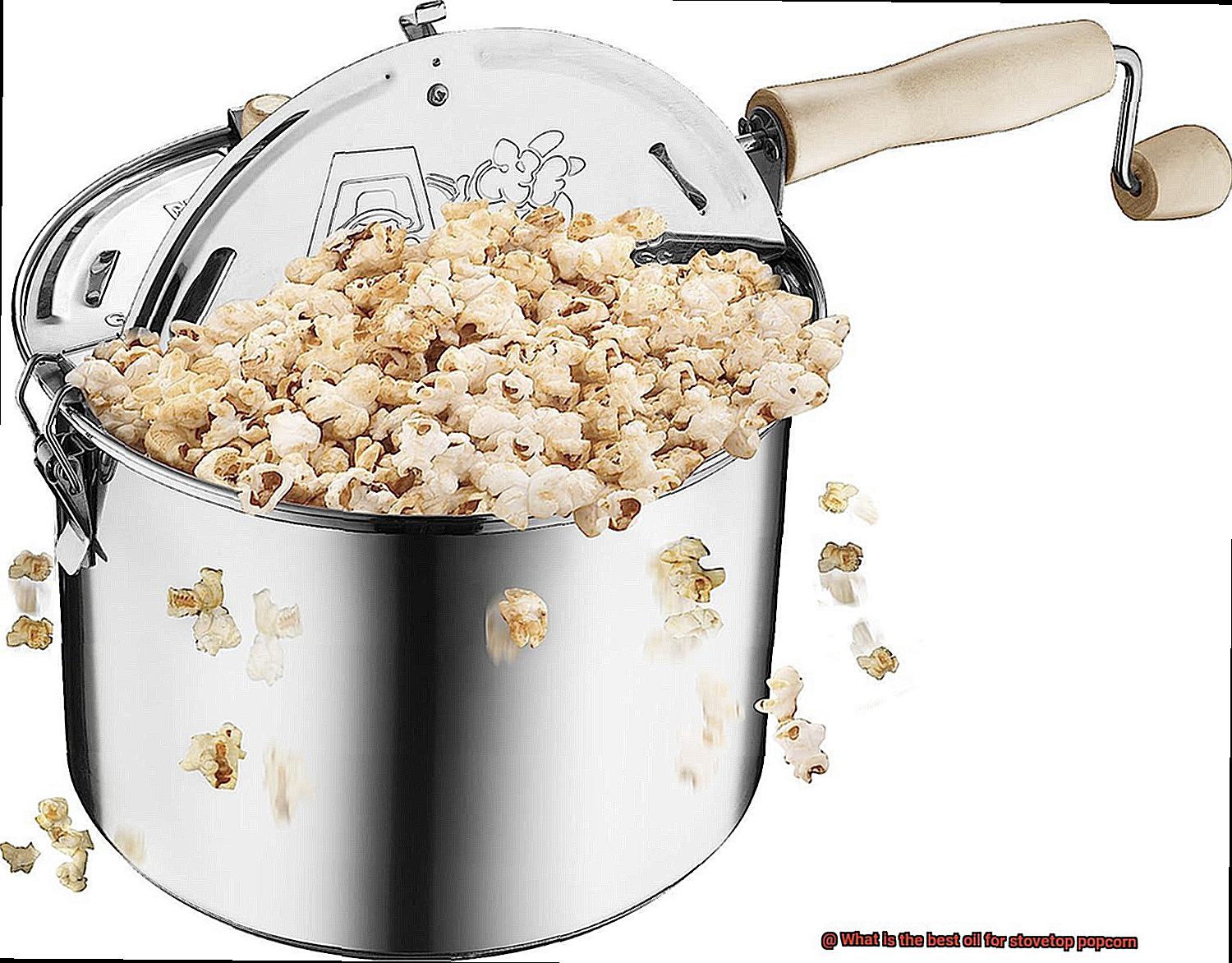
So without further ado, let’s dive into this deliciously crunchy world of popcorn and find out which oil reigns supreme when it comes to making stovetop popcorn.
Contents
What is Stovetop Popcorn?
Stovetop popcorn is a timeless and scrumptious snack that has been enjoyed for generations. Unlike the convenience of microwave or air-popped popcorn, stovetop popcorn offers a traditional way of making popcorn that allows you to control the ingredients that go into your popcorn. This gives you more flexibility in terms of flavor and nutrition, making it a healthier snack option.
The process of making stovetop popcorn involves heating oil in a pot or pan and adding popcorn kernels. As the kernels heat up, they start to pop and transform into fluffy, mouth-watering popcorn. This is a fun activity that you can do with family or friends, especially during movie nights, parties, or any other occasion.
Choosing the right oil is crucial when it comes to making stovetop popcorn. The oil you use will impact the taste and texture of your popcorn. Oils with low smoke points, such as butter or olive oil, can easily burn and create an unpleasant taste in your popcorn. In contrast, oils with high smoke points can withstand higher temperatures without burning.
If you’re wondering which oils are best for stovetop popcorn, here are some options to consider:
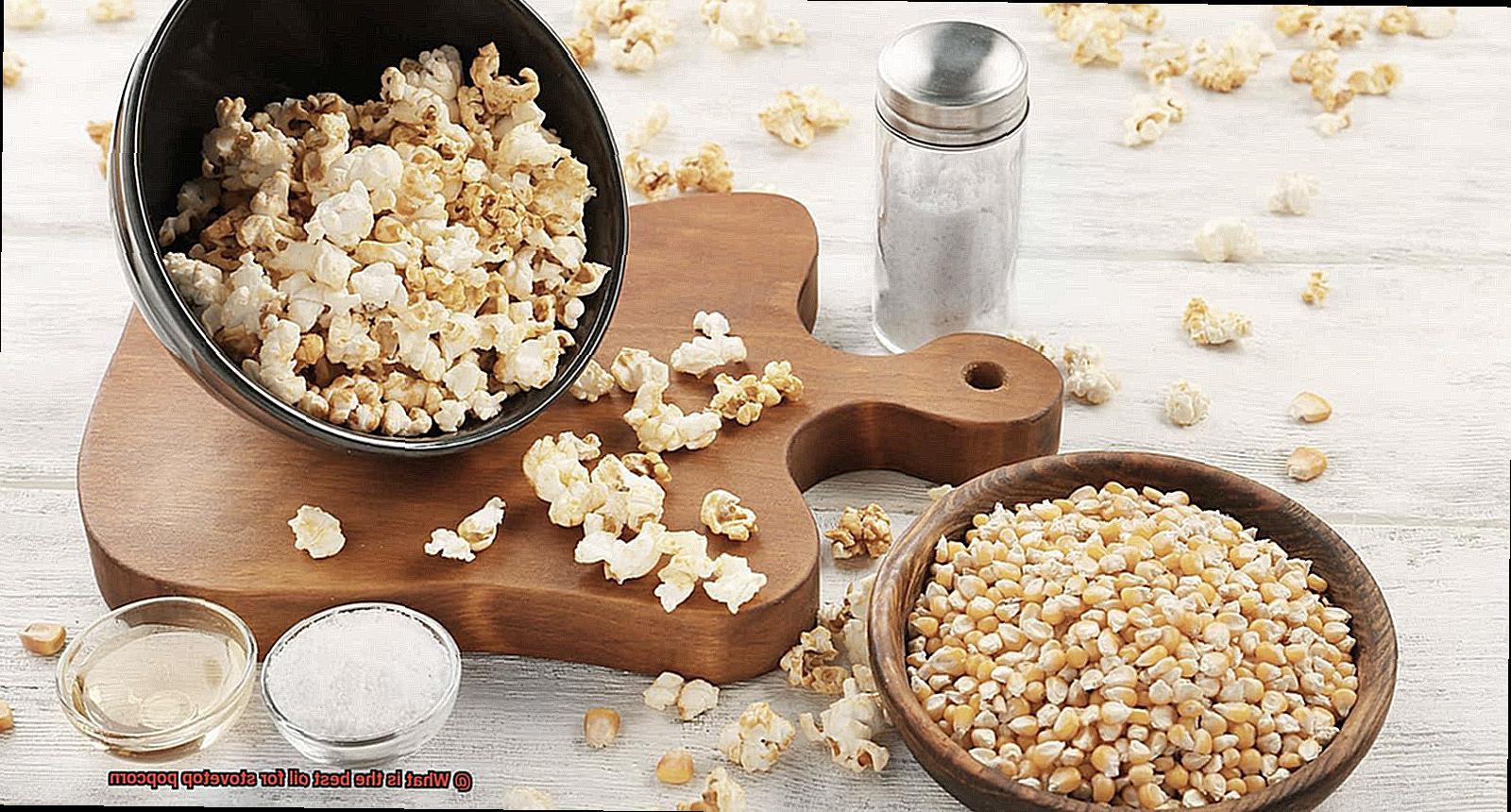
- Coconut Oil: This is one of the most popular oils for stovetop popcorn because it has a high smoke point and adds a slightly sweet flavor to your popcorn. It also has a mild flavor that won’t overpower your snack.
- Canola Oil: Another great option is canola oil, which is low in saturated fat and high in monounsaturated fat. It also has a neutral flavor that won’t interfere with the taste of your popcorn.
- Vegetable Oil: This traditional option has been used for stovetop popcorn for years and still remains a popular choice today. It has a high smoke point and a mild flavor that complements your snack.
- Peanut Oil: Lastly, peanut oil is another excellent choice for stovetop popcorn. It has a high smoke point and a nutty flavor that adds a unique taste to your popcorn. However, if you have any nut allergies, this may not be the best option for you.
What is the Smoke Point of Oil?

The secret to the perfect popcorn lies in choosing the right oil – one that can withstand the high heat needed to pop the kernels without ruining the flavor or releasing harmful chemicals. This is where the smoke point of oil comes into play.
Simply put, the smoke point is the temperature at which oil starts to break down and produce smoke. This is why it’s crucial to choose an oil with a high smoke point for stovetop popcorn. Here are some key factors to consider:

- Smoke Point: Different oils have different smoke points. Refined avocado oil has a high smoke point of around 520°F, making it an excellent choice for stovetop popcorn. On the other hand, unrefined coconut oil has a lower smoke point of around 350°F, so it may not be suitable for high-heat cooking.
- Health Benefits: While higher smoke point oils may be more suitable for stovetop popcorn, they may not necessarily be the healthiest option. For example, oils high in saturated fats like coconut oil and palm oil should be used in moderation due to their potential impact on heart health. Healthier options like olive oil and avocado oil have lower smoke points but offer numerous health benefits.
- Flavor: Finally, don’t forget about taste. Different oils can add their unique flavor to your popcorn. Coconut oil adds a slightly sweet flavor, canola oil is low in saturated fat and high in monounsaturated fat, vegetable oil is a traditional choice with a mild flavor, and peanut oil provides a nutty taste but is not suitable for people with nut allergies.
Coconut Oil for Stovetop Popcorn
Consider using coconut oil for stovetop popcorn. This increasingly popular choice offers a deliciously sweet and nutty flavor, along with a host of health benefits.
Not all coconut oils are created equal, so it’s important to look for a high-quality, refined oil that can handle the heat of cooking. Once you’ve found the right oil, here are just a few reasons why coconut oil is a great option for stovetop popcorn:
-
- Unique flavor: Tired of bland, buttery popcorn? Coconut oil adds a twist to traditional popcorn with its slightly sweet and nutty taste. It’s a great way to impress your taste buds and mix up your snack routine.
- Health benefits: Coconut oil is high in medium-chain triglycerides (MCTs), which are a type of healthy fat that can boost metabolism and improve brain function. Plus, it’s a healthier alternative to other oils commonly used for popcorn, such as vegetable or canola oil.
- Easy to use: Using coconut oil for stovetop popcorn is quick and easy. Simply melt a tablespoon or two in a large pot over medium-high heat, add the popcorn kernels, cover with a lid, and shake occasionally until the popping slows down.
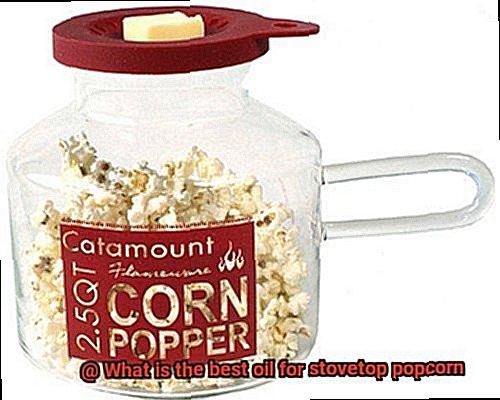
Canola Oil for Stovetop Popcorn
Look no further than canola oil, the perfect choice for your next movie night snack. As an expert on the subject, let me tell you why canola oil is the way to go.
Firstly, canola oil’s high smoke point makes it ideal for cooking popcorn on the stove. It can handle high temperatures without breaking down and creating harmful smoke, ensuring that your kernels will pop perfectly every time. Plus, its neutral taste won’t overpower the natural flavor of your popcorn, allowing you to add your favorite seasonings without any interference.
But that’s not all – canola oil is also a healthier option compared to other oils commonly used for stovetop popcorn. It has less saturated fat and more unsaturated fat, which is great news for your heart health. Additionally, canola oil contains omega-3 fatty acids, which have anti-inflammatory properties and may help reduce the risk of chronic diseases such as heart disease and arthritis.
To achieve the best results when using canola oil for your stovetop popcorn, it’s crucial to use high-quality, pure canola oil that is free from any additives or fillers. This will ensure that the oil does not impart any unwanted flavors or aromas on the popcorn. It is also recommended to use a heavy-bottomed pot with a lid to prevent burning and popping kernels.
In just a few simple steps, you can enjoy delicious and healthy homemade popcorn right from your stovetop. Heat up 2-3 tablespoons of canola oil in a pot over medium-high heat, add 1/3 cup of popcorn kernels to the pot, cover with a lid, and cook until the popping slows down to 1-2 seconds between pops. Then remove from heat and pour the popcorn into a large bowl – it’s that easy.
Vegetable Oil for Stovetop Popcorn
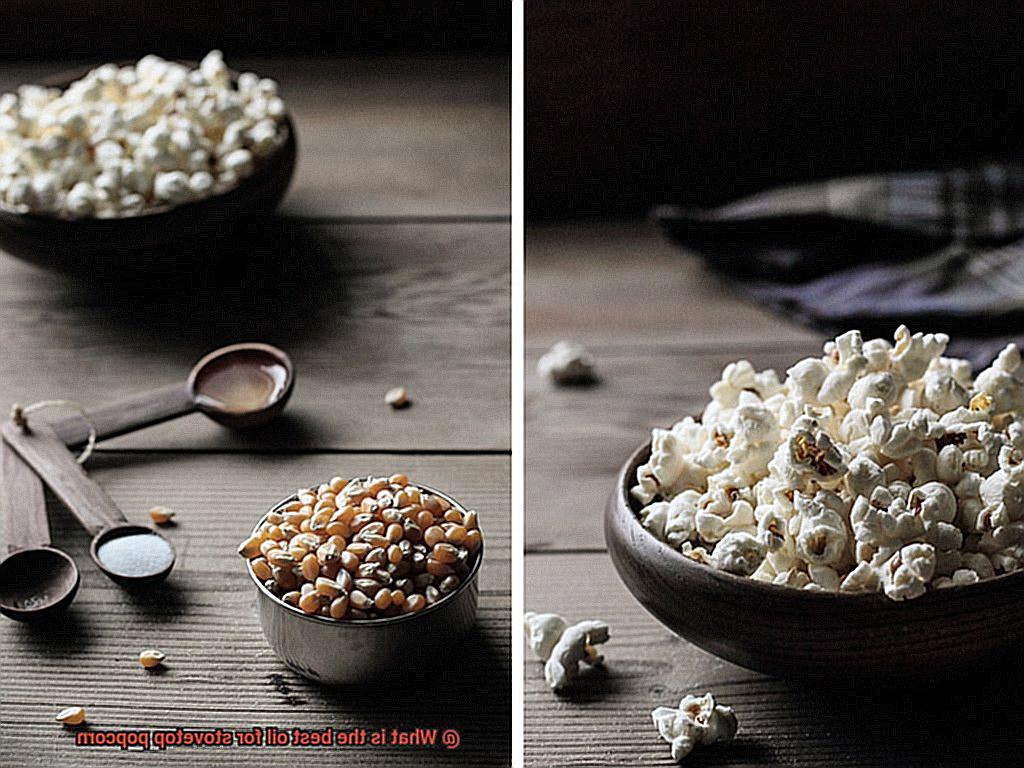
Stovetop popcorn is an easy recipe that requires only a few simple ingredients, but choosing the right oil for it can make all the difference. As an expert on this matter, let me tell you why vegetable oil is a fantastic option for stovetop popcorn.
The neutral flavor and high smoke point of vegetable oil make it a popular choice for making stovetop popcorn. It won’t overpower the taste of your popcorn, and it can be heated to high temperatures without burning or smoking excessively. However, not all vegetable oils are created equal, so here are some factors to consider.
Refined vegetable oil is ideal if you want your popcorn to have a clean and crisp flavor. It has a higher smoke point than unrefined oils and tends to have a milder taste and odor. Alternatively, if you’re looking for a healthier option, consider using an unrefined vegetable oil like avocado oil or coconut oil. These oils are less processed and contain more beneficial nutrients like vitamins and minerals. However, do keep in mind that they have a lower smoke point, so be careful not to overheat them.
Regardless of the type of vegetable oil you choose, ensure that there’s enough oil to coat the kernels evenly. This will help each kernel pop correctly and prevent them from burning or sticking together. A recommended ratio is about 2 tablespoons of oil for every 1/3 cup of popcorn kernels.
Peanut Oil for Stovetop Popcorn
If you’re searching for a delicious oil to elevate your stovetop popcorn game, look no further than peanut oil. Here’s why this oil is a must-try:
- High Smoke Point: No one wants burnt popcorn, and peanut oil’s high smoke point of around 450°F ensures that won’t happen. It can handle the heat required for popping popcorn, so you’ll end up with perfectly popped kernels every time.
- Nutty Flavor: Peanut oil adds a touch of nuttiness to your popcorn that perfectly complements its natural saltiness. This flavor isn’t overpowering, but it gives your popcorn an extra layer of deliciousness.
- Refined and Pure: When using peanut oil for stovetop popcorn, make sure to choose a high-quality oil labeled as “pure” or “refined.” This guarantees that the oil has been purified to remove impurities that could affect the flavor or quality of the popcorn.
- Easy to Use: Making stovetop popcorn with peanut oil is super simple. Heat 2-3 tablespoons of oil in a large pot over medium-high heat, add 1/2 cup of popcorn kernels, cover the pot with a lid, and shake occasionally until the popping slows down. Add your favorite toppings and enjoy.
- Versatile: Not only is peanut oil great for popping corn, but it’s also perfect for frying or sautéing due to its high smoke point and neutral flavor.
Other Oils to Consider When Making Stovetop Popcorn
If you’re a popcorn aficionado, you know that the oil used can make a huge difference in the final product. While butter and vegetable oil are popular choices, there are many other oils that are worth considering to take your stovetop popcorn to the next level.
Coconut oil is one such oil that should be on your radar. Not only does it have a slightly sweet flavor that can enhance the taste of popcorn, but it also has numerous health benefits. This superfood is high in antioxidants and lauric acid, making it a great option for those who want to indulge in a healthier snack. To get the best flavor and health benefits, be sure to use unrefined, virgin coconut oil.
Olive oil is another healthy option that you might want to try. It contains monounsaturated fats and antioxidants, which makes it an ideal choice for those who are looking for a heart-healthy snack. Olive oil has a subtle flavor that won’t overpower the taste of popcorn but can add a nice touch of savory flavor. However, it’s essential to note that olive oil has a low smoke point and should be used on low heat.
If you’re looking for an option with a high smoke point and a mild, buttery flavor, avocado oil is the way to go. Avocado oil is high in monounsaturated fats and vitamin E, which makes it an excellent choice for those who want to indulge in a healthy snack without sacrificing flavor. Additionally, it can withstand high-heat cooking like stovetop popcorn.
Lastly, sesame oil is an excellent choice if you’re looking for something that adds a unique taste to your popcorn. It has a distinct nutty flavor that can elevate your snack game to new heights. Sesame oil also contains antioxidants and anti-inflammatory properties that make it an ideal choice for those who want to indulge in a healthy snack. However, be sure to use it sparingly as it has a strong flavor that may easily overpower other flavors.
Tips for Making Perfect Stovetop Popcorn Every Time
With these simple tips, you can make perfect popcorn every time.
- Choosing the Right Oil: The type of oil you use can make a big difference in both flavor and popping success. Opt for an oil with a high smoke point, such as coconut oil or canola oil. These oils won’t burn easily and will evenly distribute heat to your kernels.
-
Use the Right Amount of Oil: Less is often more when it comes to oil for stovetop popcorn. Use about 1-2 tablespoons of oil per 1/3 cup of popcorn kernels. Too much oil can make your popcorn greasy and heavy, while too little can result in unpopped kernels.
- Choose the Right Pot: A heavy-bottomed pot with a tight-fitting lid is essential for making stovetop popcorn that pops evenly and doesn’t burn. Consider using a pot with a nonstick coating to prevent sticking and burning.
- Keep the Heat at Medium-High: Keep the heat at a medium-high level to ensure even popping without burning. Don’t be afraid to shake the pot occasionally to prevent any kernels from getting stuck on the bottom.
- Season with Your Favorite Toppings: Once your popcorn is ready, it’s time to add some flavor. Whether you prefer classic butter and salt or something more adventurous like nutritional yeast or chili powder, add your favorite toppings to make your popcorn truly delicious.
std5bhPtiw8″ >
Conclusion
In conclusion, stovetop popcorn is a timeless snack that’s perfect for any occasion. The secret to achieving the perfect taste and texture lies in choosing the right oil. With so many options out there, it can be daunting to make a choice. But fear not. This blog post has given you all the information you need to make informed decisions about the oils you use to create your ultimate stovetop popcorn.
From sweet coconut oil to low-saturated fat canola oil, each oil boasts its own unique flavor and benefits. Vegetable oil is a classic choice with a mild taste, while peanut oil adds a nutty flavor that’s not suitable for those with nut allergies.
It’s crucial to choose an oil with a high smoke point when making stovetop popcorn. A low smoke point like butter or olive oil can quickly burn and ruin your snack’s taste. So, opt for oils like coconut or canola that have higher smoke points.
But don’t forget about seasoning. Whether you prefer traditional butter and salt or more adventurous toppings like nutritional yeast or chili powder, adding your favorite flavors will take your popcorn game up several notches.
So go ahead and experiment with different oils and toppings until you find your perfect combination.

